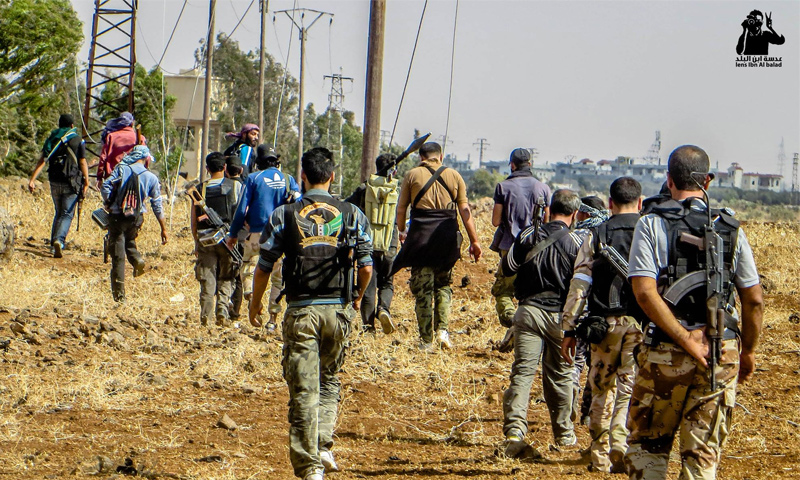



Enab Baladi – Daraa
The farms and surrounding plains of Daraa al-Balad, one of the most important agricultural fields in Daraa governorate, have abandoned their quality as agricultural lands and have become a residential land with tents housing hundreds of displaced families.
Just as this story has a humanistic side, it also has an important economic side. Those who walk around in these farms will inescapably remark that many agricultural fields are empty of crops. These farms, which are famous for growing vegetables and grains of all kinds and which also include tens of thousands of olive and fruits trees, do not live today their most beautiful days, considering the outbreak of battles a few kilometers away.
In an interview with Enab Baladi, Abdullah al-Masalama, a farmer in al-Chiyah area in Daraa al-Balad, considered that the presence of displaced people in agricultural land was not the problem in itself. He clarified that “the farms here witness a massive expansion of tents and displaced people for several years, as a result of the continuous bombardment of the neighborhoods of Daraa al-Balad, and this is not a problem. In fact, many of the landowners themselves have become displaced and residents in these lands.”
Farmers Halt the Work
These farms were not immune to the bombing of al-Assad Regime, according to Abdullah, who added: “The farms were exposed to sporadic bombardment or to the explosive barrels. They were not safe in the real sense of the word, but certainly better than the city neighborhoods that were under constant bombardment.”
But with the opposition launch of the battle to control the Menshia and Sajna villages, the farms became constantly under attack. “Al-Assad forces have been targeting the farms and the displaced communities. Although there is no military benefit, they were aiming at causing civilian casualties,” said Abdullah.
This escalation has negatively influenced the agricultural season, forcing Abdullah and many other farmers to dispense with their current season. “The battles started in the month of February and have lasted up to now for almost two months. This period is considered the heart of the season, and losing it means a complete loss,” clarified Abdullah.
He added that he had to cancel his season for fear of a big loss. Abdullah said: “I was planning to plant my land with vegetables, like tomatoes and cucumber, but it needed an adventure and I might have suffered a great loss.”
Abdullah described the dangers facing the farmer today as “the agricultural battle.” He clarified that “farms were bombarded with more than four rockets loaded with hundreds of cluster bombs, which are now spreading among the farms and threatening the lives of farmers. Also, the bombardment does not stop, and the crops are subject to fire at any moment as a result of this bombing. Further, laborers who work in harvesting crops refuse to work in this area and there is no possibility of using agricultural machinery in such circumstances. Above all, prices do not encourage entering this agricultural battle.”
Fear of Fire
Ayman Bajbouj, owner of an agricultural land in the Hawira area in southern Daraa al-Balad, told Enab Baladi about his wishes that the battle would end as soon as possible, especially before the start of the olive harvest season. He clarified that “this period is normally allotted to taking care of the olive trees, plowing and watering the land. But since the beginning of the battle, I could not take care of trees as it is required, given the situation of shelling and clashes.
Ayman pointed out that the continuation of the shelling, with the start of the summer season, poses a great threat to agricultural land. “We are afraid of fire that may spread rapidly in the summer, especially with the farmers’ absence from their land and the difficulty of stopping fire immediately,” said Ayman.
He concluded by saying that the concern of farmers for their land is justified, but the concern for the success of the battle and the safety of the fighters are more important. He claimed: “We cannot ask the fighters to focus on the safety of agricultural land, in addition to the military action they are carrying out. In fact, the farmer’s loss of his agricultural season in exchange for the liberation of the city is not perceived as a loss when compared to what the fighters are doing in the battlefield.”
The scenes of the burning agricultural crops, which were repeated many times in the first years of the revolution, could not be forgotten. In fact, the burning of agricultural crops was the aim of al-Assad Forces in an attempt to force the farmer to leave his land on the one hand, and to hit the economy of the areas that are controlled by the opposition on the other. Later, with the expansion of opposition control over large areas of governorates’ countryside and its control of the food of the Regime – controlled areas as well as those of the opposition, the pace of targeting decreased, under the pressure of the collapse of the Syrian Regime’s economy.
if you think the article contain wrong information or you have additional details Send Correction